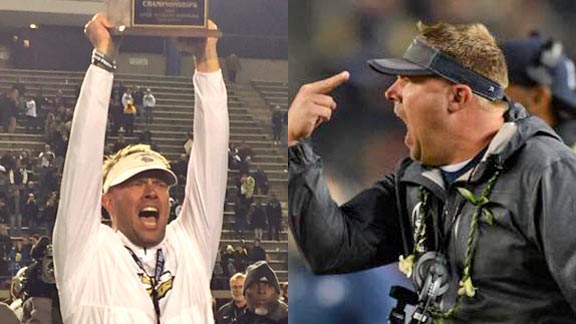
Jason Negro raises CIF title trophy after team won in 2019 (left) & gestures to officials in photo at right during 2013 CIF state title game win. Photos: Mark Tennis & Scott Kurtz.
St. John Bosco’s Jason Negro is not just the 2019 State Football Coach of the Year. He is also at the same time leading off our end-of-the-decade parade of honors by being named the State Coach of the Decade. The Braves just won their third CIF Open Division state title since Negro took over their program in 2010. You might be surprised to know that it wasn’t an overnight success, but he is the primary person with the vision to take the Bellflower school to its current status as an elite national powerhouse.
To read about this year’s Medium Schools and Small Schools State Coaches of the Year, CLICK HERE.
Note: We hope you enjoy this free post. Cal-Hi Sports All-State Football content that will be for Gold Club members include second, final list of nominees plus second team, third team overall and All-State Underclass. The free posts will be first team overall and first team small schools and medium schools. If you want to check out all of our rankings content, all of our all-state content and state record updates, you can check it out for just $3.99 to cover a one-month subscription. For info, CLICK HERE.
It’s been 10 years since Jason Negro became the head football coach at St. John Bosco of Bellflower. Two years later, the Braves were among the top teams in Southern California. And since then, they’ve won three CIF Open Division state titles, including the one they grabbed last week with a 49-28 victory at Cerritos College over De La Salle of Concord.
All of that just made it a perfect time for Negro to be selected as the Cal-Hi Sports State Coach of the Year for the 2019 season, an honor that almost always is only given to a coach once and had not gone to him previously. Plus, at the end of the decade, it was time for a State Coach of the Decade to be decided. Since Negro’s tenure at the school so far exactly matches the 10 years of the decade, since he’s the one who primarily had the vision for what the Bosco program could become and since he’s won the most CIF Open Division state titles over the 10 years, he’s getting a double dose of honors.
“Holy smokes, didn’t expect that,” said Negro when informed of the double coaching honors last Friday during a phone interview. “That’s amazing.”
State Coach of the Decade
A 1991 graduate of St. John Bosco and a former athlete at the school himself, Negro landed the head coaching job there in 2010 after he was a head coach for seven years at Trabuco Hills of Mission Viejo. At Trabuco Hills, his teams won two Sea View League titles and earned CIF Southern Section playoff appearances five times. He was a head coach at the 2008 Orange County North/South All-Star game.
“I think one of the reasons I first got the job is that I thought this place could be a gold mine,” said Negro, who also was an assistant coach and teacher for three years at St. John Bosco prior to his seven-year stint at Trabuco Hills. “This is an all-male school surrounded by some of the best athletic talent in the country. I knew if we organized it correctly and built a winning culture that we’d attract kids. I never imagined it would be like this, though.”
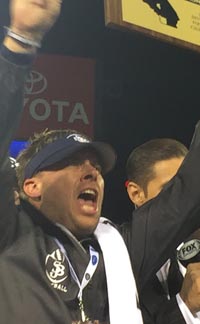
Compare this celebration photo of Coach Negro in 2016 to the one we took for 2019 above. Photo: Mark Tennis.
In Negro’s first season, the Braves didn’t qualify for the CIFSS playoffs and only finished 5-5. They were better in 2011 at 8-4, but it wasn’t until Negro’s third season in 2012 with a sophomore quarterback named Josh Rosen in which there was a spark of something that might be great. That team went to the CIFSS D1 semifinals with a 12-0 record (four early wins from that year later became forfeit losses) and lost on a foggy night 13-10 to Long Beach Poly.
“We had so many guys on that team that were underclassmen and came back in 2013,” Negro recalled. “They were the ones that made us what we are, they were the ones that raised the bar for the others to follow.”
That 2013 team not only went 16-0 and won the school’s first CIF Open Division state title, but did it mostly by blowout margins. Most who witnessed Bosco’s 20-13 victory in the final game over De La Salle of Concord (which had won four straight CIF state titles at the time and would win two more in 2014 and 2015) knew that the Braves were the better team, but De La Salle held on by forcing field goal attempts and there was more than one touchdown called back due to penalty.
“For us to beat those guys (De La Salle) after all they’ve done was special,” Negro said. “Josh was still a junior but that’s the senior class that built Bosco.”
Rosen would go on to star at UCLA and later became a first-round NFL draft pick by the Arizona Cardinals. He has played this season for the Miami Dolphins.
After that 2013 season, a new threat began to emerge for the Braves as Trinity League rival Mater Dei of Santa Ana began to ramp up its pipelines of talent.
“When I started, Servite (Anaheim), Orange Lutheran and Mater Dei were the bar,” Negro said. “Then from 2011 to 2015 we had beaten Mater Dei six straight times. I think Bruce (head coach Bruce Rollinson) told everyone there, ‘We need to recalibrate.’ Bruce and I talked a lot because I am a guy who wants to share. We talked about the evolution of social media, youth camp. All of this infused talent has made both us more competitive.”
Mater Dei has done more than recalibrate. The Monarchs and Braves in the last four to five years have more resembled two nations in a super-powered arms race, attracting many transfers and the most promising incoming freshmen talent not just in their local areas, but from places throughout the L.A. and Orange County regions.
In 2016, the Monarchs won the regular season matchup over the Braves, but there was an avenging win by Negro’s team in the CIF Southern Section Division I championship. De La Salle had a down year for its program and was no match in the state final as Bosco claimed its second state title with a 56-33 victory.
The same scenario has repeated itself for the last three seasons, except that in 2017 the Monarchs beat the Braves twice. In last year’s games, Bosco won impressively in the regular season only to lose in a rematch for the CIFSS D1 title. This year’s team at Bosco won in the second game after losing to Mater Dei in the regular season.
For the entirety of the decade, Negro’s teams compiled a 126-18 record. On the field, since 2012, his teams have gone 12-1, 16-0, 12-2, 13-1, 13-2, 11-3, 13-1 and 13-1. There were only a handful of teams in the state (at any level of competition) that finished with better records, including De La Salle (130-10), Folsom (135-12) and Mission Viejo (117-13).
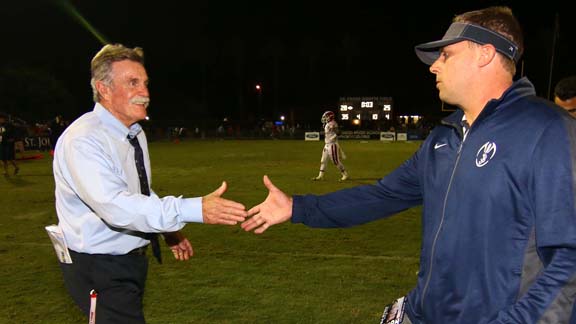
Our State Coach of the Decade for the 1990s meets our State Coach of the Decade for the 2010s after one of their many epic matchups of the decade. Photo: Nick Koza/sportsamp.com
Cal-Hi Sports State Coaches of the Decade Since 1970
1970s: Chris Ferragamo (Banning, Wilmington). This was the decade of the great Banning-Carson teams in the L.A. City Section. Ferragamo’s Pilots won four section titles in the decade (Carson had two with the great Gene Vollnogle coaching). Ferragamo was 1977 State Coach of the Year and Banning was 1976 State Team of the Year.
1980s: Bob Ladouceur (De La Salle). This honor was actually done at the time in 1989 and went to the architect of a program that had started to get really good at the medium schools level in 1982 and by the end of the decade had become a state powerhouse at the highest level. Ladouceur retired after the 2012 season with five CIF state titles and an all-time best state coaching record of 399-24-3.
1990s: Bruce Rollinson (Mater Dei). State Coach of the Year for 1994. Rollinson’s Monarchs teams from 1994 and 1996 were crowned No. 1 in the nation by USA Today. The 1998 team lost to De La Salle, but later took down unbeaten Long Beach Poly for the top CIFSS divisional title.
2000s: Matt Logan (Centennial, Corona). Toughest decade to pick between Logan and Mission Viejo’s Bob Johnson (also knowing that Ladouceur would only be picked once). Centennial won its only state title in 2008 and Logan’s run-pass-option offense has become legendary.
2010s: Jason Negro (St. John Bosco). Similar to Coach Lad for the 1980s and Coach Rollinson for the 1990s, it’s the process of building a program from a modest point to historically great proportions is what stands out the most.
State Coach of the Year
It might not have seemed like it, with all of the Division 1 college prospects on the roster, plus one of the top two quarterbacks in the nation in D.J. Uigalelei, that there would be any difficulty for the Braves in 2019. To finish on top, however, required adjustment.
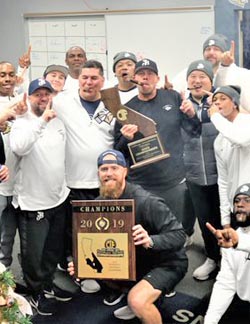
Coach Negro (holding CIF state trophy) and some of his staff are shown getting ready to light cigars after their final game of 2019 season. Photo: Twitter.com.
“Comparing championship teams is super hard, but this team played the most competitive schedule we’ve ever had,” Negro said. “We had to play five out-of-state teams, we had to fly to Hawaii, then come back and play Servite. Plus, the way we played to beat Centennial, Mater Dei and De La Salle in our last three games was difficult.”
When the Braves played the Monarchs in the regular season, it was the Monarchs that were No. 1 in the nation at the time and it was the Monarchs and their top national quarterback prospect, Bryce Young, that prevailed in a 38-24 triumph.
“We could not allow Bryce to scramble and (Kody) Epps hurt us the first time,” Negro said. “In the second game, we were able to limit those things.”
Still, Bosco’s own offense in that second game couldn’t get untracked and Mater Dei still held a 28-5 lead until late in the second quarter. The Braves rallied for a score just before halftime, then really got going in the third quarter. When the onslaught was over, they had scored 34 straight points for a 39-28 lead and held on for a 39-34 victory.
After the win over De La Salle in the state final, Bosco was almost unanimously considered No. 1 in the nation in all of the major polls. That was different than in 2013 when most of the major polls had Katy of Texas No. 1. The Braves can still claim a national title for that season because they were No. 1 in computer rankings.
When asked what he’s learned to perhaps do differently as his coaching career at Bosco has evolved in the last 10 years, it’s that he’s “kind of loosened the reigns” on the players, letting them “take more ownership” of the program.
“On that last Thursday after our last practice before De La Salle, I just told them I’ve got nothing left to say,” he recalled. “D.J. and Court (Williams) stood up and took them all off to the side, all by themselves. I don’t know what was said, but we sure played good two days later.”
With Uigalelei, Williams and a host of other seniors moving on to college, Negro’s program still shows little signs of slowing down. He’s young enough to consider jumping up to the college level, but that might take big dollars. Plus, he and wife, Carrie, are busy raising two daughters, Rylie, a junior at Edison High (Huntington Beach), and Reese, who is in the eighth grade.
“I like where I’m at,” Negro said. “I don’t like the nomad nature of a college coach, moving around from job to job. Obviously, if the financial part of it was great, that would be cool. I’m just at the pinnacle right now and don’t want to stop.”
Cal-Hi Sports State Coach of the Year
All-Time Honor Roll
(All selections by CalHiSports.com)
(Based on research by the late Nelson Tennis, our founder, prior to 1979)
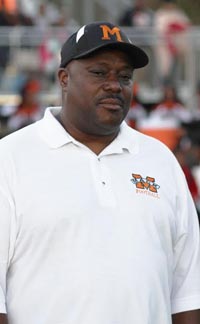
Michael Peters of Oakland McClymonds faces different challenges at his school than others from private schools. Photo: Willie Eashman.
2019 — Jason Negro (Bellflower St. John Bosco)
13-1
2018 — Michael Peters (Oakland McClymonds)
12-2
2017 — Kris Richardson (Folsom) 16-0
2016 — Dave White (Edison, Huntington Beach)
13-2
2015 — Mike Janda (Bellarmine, San Jose) 13-2
2014 — Kurt Bruich (Redlands East Valley) 15-1
2013 — Ed Croson (Chaminade, West Hills) 14-2
2012 — Ernie Cooper (Granite Bay) 13-3
2011 — Mike Papadopoulos (Vacaville) 13-1
2010 — Earl Hansen (Palo Alto) 14-0
2009 — Jim Benkert (Westlake, Westl. Vill.) 14-0
2008 — Mike Alberghini (Grant, Sacramento) 14-0
2007 — Ed Buller (Oak Grove, San Jose) 12-1
2006 — Bob McAllister (Carlsbad) 10-0-2
2005 — Harry Welch (Canyon, Canyon Country)
13-1
2004 — Matt Logan (Centennial, Corona) 13-1
2003 — Steve Grady (Loyola, Los Angeles) 11-3
2002 — Kevin Rooney (Notre Dame, Sherman Oaks) 14-0
2001 — Bob Johnson (Mission Viejo) 14-0
2000 — Jerry Jaso (Poly, Long Beach) 14-0
1999 — Mike Herrington (Hart, Newhall) 14-0
1998 — Randy Blankenship (Clovis West, Fresno) 12-1
1997 — John Beam (Skyline, Oakland) 12-0
1996 — Dave Silveira (Alhambra, Martinez) 13-0
1995 — Larry Welsh (Atascadero) 14-0
1994 — Bruce Rollinson (Mater Dei, Santa Ana) 14-0
1993 — John Barnes (Los Alamitos) 14-0
1992 — Mark Paredes (Bishop Amat, La Puente) 15-0
1991 — Herb Meyer (El Camino, Oceanside) 13-1
1990 — Pat Preston (Bakersfield) 13-0
1989 — Dick Bruich (Fontana) 14-0
1988 — Norm Dow (Live Oak, Morgan Hill) 11-0-1
1987 — Bennie Edens (Point Loma, San Diego) 13-0
1986 — Bob Ladouceur (De La Salle, Concord) 12-0
1985 — Charlie Wedemeyer (Los Gatos) 13-1
1984 — Tim Simons (Clovis) 12-0-1
1983 — Ron Calcagno (St. Francis, Mountain View) 13-0
1982 — Wayne Schneider (Tracy) 12-1
1981 — Marijon Ancich (St. Paul, Santa Fe Springs) 14-0
1980 — Bill Workman (Edison, Huntington Beach) 14-0
1979 — Ron Lancaster (Cordova, Rancho Cordova) 13-0
1978 — Jerry Deuker (Pinole Valley, Pinole) 11-1
1977 — Chris Ferragamo (Banning, Wilmington) 11-1-1
1976 — Benny Pierce (Saratoga) 13-0
1975 — Ed Lloyd (Cardinal Newman, Santa Rosa) 12-0
1974 — Dick Haines (Vista) 13-0
1973 — Dwayne DeSpain (Los Altos, Hacienda Heights) 12-0-1
1972 — Bob Hitchcock (Temple City) 13-0
1971 — Gene Vollnogle (Carson) 12-0
1970 — Jack Neumeier (Granada Hills) 11-1
1969 — Forrest Klein (Alameda) 9-0
1968 — Tom Burt (Los Altos) 9-0
1967 — Clare Van Hoorebeke (Anaheim) 12-1
1966 — Ernie Johnson (El Rancho, Pico Rivera) 13-0
1965 — Dick Coury (Mater Dei, Santa Ana) 12-0-1
1964 — John Hanna (Bellarmine, San Jose) 10-0
1963 — Paul Briggs (Bakersfield) 9-0
1962 — Bob Berry (Willow Glen, San Jose) 9-0
1961 — Joe Marvin (Sequoia, Redwood City) 9-0
1960 — Sam Cathcart (Santa Barbara) 11-1
1959 — Dave Levy (Long Beach Poly) 11-0
1958 — Paul Huebner (Banning, Wilmington) 11-0
1957 — Johnny Johnson (Oroville) 9-0
1956 — Dick Hill (Downey) 12-0-1
1955 — Duane Maley (San Diego) 11-0-1
1954 — Aaron Wade (Centennial, Compton) 10-1-1
1953 — Milt Axt (Poly, San Francisco) 10-0
1952 — Fred Moffett (Berkeley) 9-0
1951 — Hod Ray (Palo Alto) 8-0
1950 — Ernie Busch (Merced) 11-0
1949 — Bob Patterson (Vallejo) 10-0
1948 — Harry Edelson (Fremont, Los Angeles) 9-0-1
1947 — Jim Sutherland (Santa Monica) 12-0
1946 — George Hobbs (Alhambra) 12-0
1945 — Colon Kilby (Vallejo) 10-0
1944 — Bert LaBrucherie (Los Angeles) 7-0
1943 — Larry Siemering (Stockton) 10-0
1942 — Brick Johnson (Piedmont) 7-0
1941 — Roy Richert (Castlemont, Oakland) 5-0-1
1940 — Clarence Schutte (Santa Barbara) 9-1
1939 — Palmer Muhl (Woodland) 8-0
1938 — Ras Johnson (Galileo, San Francisco) 8-0-1
1937 — Jim Blewett (Manual Arts, Los Angeles) 8-0
1936 — Harlan Lee (Red Bluff) 7-0-1
1935 — Paul Hungerford (Poly, San Francisco) 9-0
1934 — Orian Landreth (Long Beach Poly, Long Beach) 12-1
1933 — Dick Arnett (Inglewood) 8-2-1
1932 — Harry Shipkey (Salinas) 11-0
1931 — Tex Oliver (Santa Ana) 13-0
1930 — John Price (Bonita, La Verne) 10-0
List continues back to 1896 in CalHiSports.com State Record Book & Almanac.
Mark Tennis is the co-founder and publisher of CalHiSports.com. He can be reached at markjtennis@gmail.com. Don’t forget to follow Mark on the Cal-Hi Sports Twitter handle: @CalHiSports




